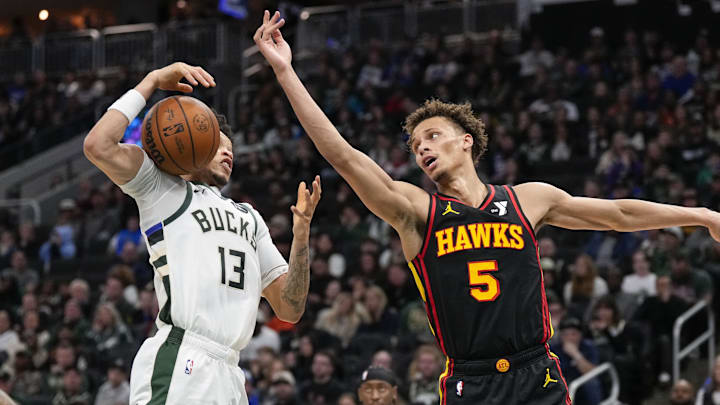In his third NBA season and first season with the Atlanta Hawks, Dyson Daniels is making quite an impression on the league. Daniels, who just turned 22 years old, is viewed by many as a legitimate candidate for not just one, but two major individual awards in the 2024-25 NBA season.
First, Daniels is a candidate for Defensive Player of the Year, leaning on productivity in steals that has not been seen in the NBA in multiple decades. Then, Daniels is actually viewed as the individual betting favorite to win Most Improved Player, building on relatively modest overall production in his first two seasons and exploding in his third campaign.
Through 73 games, Daniels is averaging 14.2 points, 5.8 rebounds, 4.3 assists, and a league-leading 3.0 steals per game this season. Those numbers could change down the stretch but, at the very least, he's been impressive and Daniels is evoking memories of previous Atlanta Hawks winners in DPOY and MIP categories.
Here, we will take a look back at the previous award winners for the Hawks. First, we'll look at the two instances in which a Hawk won Defensive Player of the Year, followed by the one and only MIP win for the franchise.
DPOY: Dikembe Mutombo (1996-97)
1996-97 was Mutombo's first season in Atlanta after spending his first five NBA seasons in Denver. He won DPOY in 1994-95 with the Nuggets, but Mutombo further cemented legacy with his first win as a member of the Hawks.
Mutombo was a key centerpiece of a 56-win Hawks team, appearing in 80 games as the unquestioned anchor of a standout defense. He also averaged 3.3 blocks and 11.6 rebounds per game, earning an All-Star nod and finishing No. 13 in MVP voting in his age-30 season.
DPOY: Dikembe Mutombo (1997-98)
One year after Mutombo became the first Hawk to win DPOY, he went back-to-back. This was the third of four career DPOY honors for the Hall of Fame center.
Mutombo again anchored a 50-win team for the Hawks, and he earned third team All-NBA and All-Star honors in addition to a DPOY win. He played in all 82 regular season games, averaging 3.4 blocks and 11.4 rebounds per game. Opponents also shot just 46 percent inside the arc against the Hawks that season, and Atlanta was No. 2 in the NBA in yielding only 21.6 free throw attempts per game.
Of note, Mutombo's 1997-98 win came very narrowly over Seattle's Gary Payton. Mutombo received 39 first-place votes to 37 for Payton.
MIP: Alan Henderson (1996-97)
Most Improved Player is sometimes a fickle award, as the criteria seems to morph from season to season. In recent years, big-name players making a leap from good to great have cornered the market, but role players often took home the hardware in earlier iterations.
Alan Henderson is a prime example, as the No. 16 pick in the 1995 NBA Draft won the award in his age-25 season in 1996-97. It was Henderson's third season in the NBA, and 1996-97 also doubled as his best over a 12-year NBA career.
In the previous year, Henderson averaged 6.6 points and 3.9 rebounds per game while appearing in only 30 games in a reserve role. In 1996-97, that jumped to 69 games (33 starts) and per-game averages of 14.3 points and 6.4 rebounds per game. He narrowly edged out Sacramento's Corliss Williamson and Golden State's Donyell Marshall for the award, garnering 33 first-place votes.
Henderson did maintain double-digit scoring averages in the next three seasons after his 1996-97 breakout, but he transitioned back into a full-time bench role beginning in 2001-02 until his final NBA season in 2006-07 with the Philadelphia 76ers.
